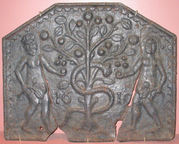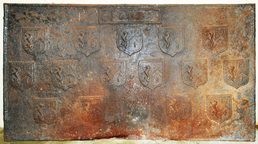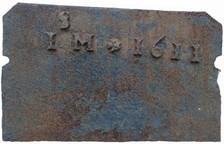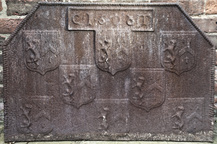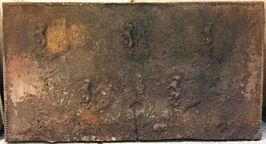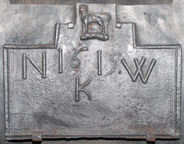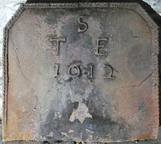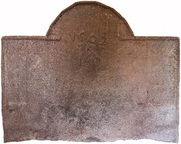-
695
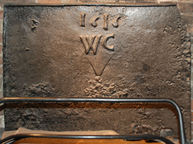 ? x ? mmImage subject to copyright
? x ? mmImage subject to copyrightDescription: Rectangular; fillet edging (top and sides only); top centre, date formed of individual letter stamps; below date, initials carved as single stamp, overstamped and showing v-shaped extension below.
Notes: The reason for the unusual shape of the base of the initial stamp is not understood.
Inscription: 1616 / WC
- Decoration tags:
- rectangular (shape)
- fillet (edging)
- carved stamps
- individual numbers
- text
Manufactured: in 1616 in England.
Current location: Nash's House, Stratford-upon-Avon, Warwickshire, England.
(part of the Shakespeare's Birthplace Trust museum group)
- Attached to series:
- Date & initials firebacks
-
697
Description: Canted rectangle; embattled, cavetto moulded edging; central tree with fruit and leaves, a snake, facing right, with a human face in profile entwined, in ‘S’ shape, around the trunk and lower branches; to the left, a naked, bearded male figure holding an apple in his left hand and a branch in his right for modesty; to the right a naked female figure with apple and branch also; the date split either side of the snake and tree trunk.
Notes: Similarities with an armorial in the date, numerals and edging suggest a common pattern-maker.
Copies of this fireback are known.
Inscription: 16 19
- Decoration tags:
- rectangular with canted top corners (shape)
- embattled cavetto (edging)
- whole carved pattern
- pictorial
- biblical
- text
- animals
- humans
- plants
Manufactured: in 1619 in England.
Current location: Stroud District Museum, Stroud, Gloucestershire, England.
Museum number: STGC 2371 (part of the Stroud Museum museum group)
- Attached to series:
- 1619 series
- Old Testament & Apocrypha firebacks
- Adam & Eve firebacks
-
699
Description: Rectangular; twisted rope edging on top and sides; cavetto-moulded-edged rectangle top centre, enclosing date between initials; 16 shields of Ayloffe impaling Sulyard in three rows (5-6-5); Ayloffe: sable, a lion rampant Or, collared gules, between three crosses formy of the second; Sulyard: argent, a chevron gules between three pheons inverted sable.
Notes: William Ayloffe (c1535-1584) of Bretons, Hornchurch, Essex, Justice of the Court of Queen’s Bench, married (c1560) Jane, dau. of Sir Eustace Sulyard, of Runwell, Essex. The initials 'CT' are likely to be those of Charles Tyler, a founder whose working life and that of his family have strong parallels with the occurrence of these firebacks. Indentations in the spaces in the upper parts of this fireback appear to impressions of fingers.
Copies of this fireback are known.
Inscription: C.1.6.0.1.T
Arms: Ayloffe impaling Sulyard (William Ayloffe of Bretons, Hornchurch)
- Decoration tags:
- rectangular (shape)
- rope (edging)
- carved stamps
- individual letters
- individual numbers
- armorial
- text
Manufactured: in 1601 possibly at Bedgebury Furnace, Goudhurst in the Weald area of England.
Current location: not known.
- Attached to series:
- Ayloffe series
- Personal armorial firebacks
-
1167
Description: Canted quasi-rectangular shape; no edging; parallel with top edge, initials in triad to left, separated from date by a small, ill-defined flower stamp.
Notes: The serifed character set is boldly impressed, although the S is indistinct, suggesting that some of the moulding sand may have filled the impression before casting. The indentations on each side were cut to accommodate mouldings. Tennants Auctioneers sale, Leyburn, North Yorkshire, 20 March 2015, lot 781.
Inscription: ISM [triad] 1611
- Decoration tags:
- rectangular with canted top corners (shape)
- none (edging)
- individual letters
- individual numbers
- text
- plants
Manufactured: in 1611 in England.
Current location: not known.
- Attached to series:
- Miscellaneous stamp firebacks
-
1315
Description: Canted rectangular shape; twisted rope edging (top and sides); top centre, rectangular panel with cavetto-moulded edging enclosing date between initials CT; below, eight shields of Ayloffe impaling Sulyard in three rows (3-2-3); Ayloffe: sable, a lion rampant Or, collared gules, between three crosses formy of the second; Sulyard: argent, a chevron gules between three pheons inverted sable.
Notes: William Ayloffe (c1535-1584) of Bretons, Hornchurch, Essex, Justice of the Court of Queen’s Bench, married (c1560) Jane, dau. of Sir Eustace Sulyard, of Runwell, Essex. The initials 'CT' are likely to be those of Charles Tyler, a founder whose working life and that of his family have strong parallels with the occurrence of these firebacks. The reversal of the second 6 in the date is, so far, unique in this series.
Inscription: C 1606 T [the second 6 reversed]
Arms: Ayloffe impaling Sulyard (William Ayloffe of Bretons, Hornchurch)
- Decoration tags:
- rectangular with canted top corners (shape)
- rope (edging)
- carved stamps
- individual letters
- individual numbers
- heraldic
- armorial
- text
Manufactured: in 1606 possibly at Bedgebury Furnace, Goudhurst in the Weald area of England.
Current location: in private hands, Tenterden, Kent, England.
- Attached to series:
- Ayloffe series
- Personal armorial firebacks
-
1066
Description: Rectangular; twisted rope edging (top and sides only); five shields of Ayloffe impaling Sulyard in two rows, 3-2; Ayloffe: sable, a lion rampant Or, collared gules, between three crosses formy of the second; Sulyard: argent, a chevron gules between three pheons inverted sable.
Notes: William Ayloffe (c1535-1584) of Bretons, Hornchurch, Essex, Justice of the Court of Queen’s Bench, married (c1560) Jane, dau. of Sir Eustace Sulyard, of Runwell, Essex.
Arms: Ayloffe impaling Sulyard (William Ayloffe of Bretons, Hornchurch)
- Decoration tags:
- rectangular (shape)
- rope (edging)
- carved stamps
- heraldic
- armorial
Manufactured: in the early-17th century in the Weald area of England.
Current location: not known.
- Attached to series:
- Ayloffe series
- Personal armorial firebacks
-
960
Description: Rectangular with two-stepped top; twisted rope edging to top of main plate and sides of lower step, reused frame moulding for sides of main plate; top centre, stamp formed of a talbot statant guardant upon a wreath; date below crest stamp; initials in triad, separated by, and below, date.
Notes: Straight elements in the letters and numbers are formed of the same short lengths of twisted rope that are used to form the edging; curved elements appear to have been formed by hand drawing in the casting sand; the talbot crest, which in this instance has been over pressed and shows the shape of the backing, has been seen on other firebacks indicating a common source, and is associated with firebacks with a stepped-shape.
Inscription: N 1615 W / K
- Decoration tags:
- stepped (shape)
- rope and wood moulding (edging)
- simple stamps
- carved stamps
- individual letters
- individual numbers
- heraldic
- text
Manufactured: in 1615 in the Weald area of England.
Current location: Titsey Place, Titsey, Surrey, England.
- Attached to series:
- Talbot crest series
- Stepped firebacks
-
299
Description: Arched rectangular shape; gadrooned edging (top and sides); initials, in separate stamps, at top of arch; date probably in separate stamps, below; spindle used as a stamp repeated three times, one between date and initial stamps, the other two below to left and right.
Notes: The same base board and spindle have been used for other firebacks of the same period. A similar casting (no. 1284) has the 'W' in a slightly different position.
Inscription: I W / 16 22
- Decoration tags:
- rectangular with round arch (shape)
- gadrooned (edging)
- simple stamps
- individual letters
- individual numbers
- text
- objects
Manufactured: in 1622 possibly at Cuckfield Furnace in the Weald area of England.
Current location: Gwydir Castle, Trefriw, Conwy, Wales.
- Attached to series:
- Spindle series
- Spindle/distaff firebacks
-
1165
Description: Canted rectangular shape; braided rope edging (top and sides); top centre, initials 'TSE' in triad, above centred date.
Notes: The use of braided rope edging is unusual. The fireback was formerly in a house in Westmoreland associated with the Salkeld family.
Inscription: TSE [triad] / 1612
- Decoration tags:
- rectangular with canted top corners (shape)
- braided rope (edging)
- carved stamps
- individual letters
- individual numbers
- text
Manufactured: in 1612 in England.
Current location: Gwydir Castle, Trefriw, Conwy, Wales.
- Attached to series:
- Date & initials firebacks
-
1254
Description: Arched rectangular shape; twisted rope edging (top, and sides short of bottom), with shoulder edging extending into base of arch; upper centre, date '1602' slanting down to right; below date, initials 'IPD' in triad.
Notes: The initials are likely to be those of a couple whose surname begins with 'P'.
Inscription: 1602 / I P D [triad]
- Decoration tags:
- rectangular with round arch (shape)
- rope (edging)
- carved stamps
- individual letters
- individual numbers
- text
Manufactured: in 1602 possibly in the Weald area of England.
Current location: not known.
- Attached to series:
- Date & initials firebacks
